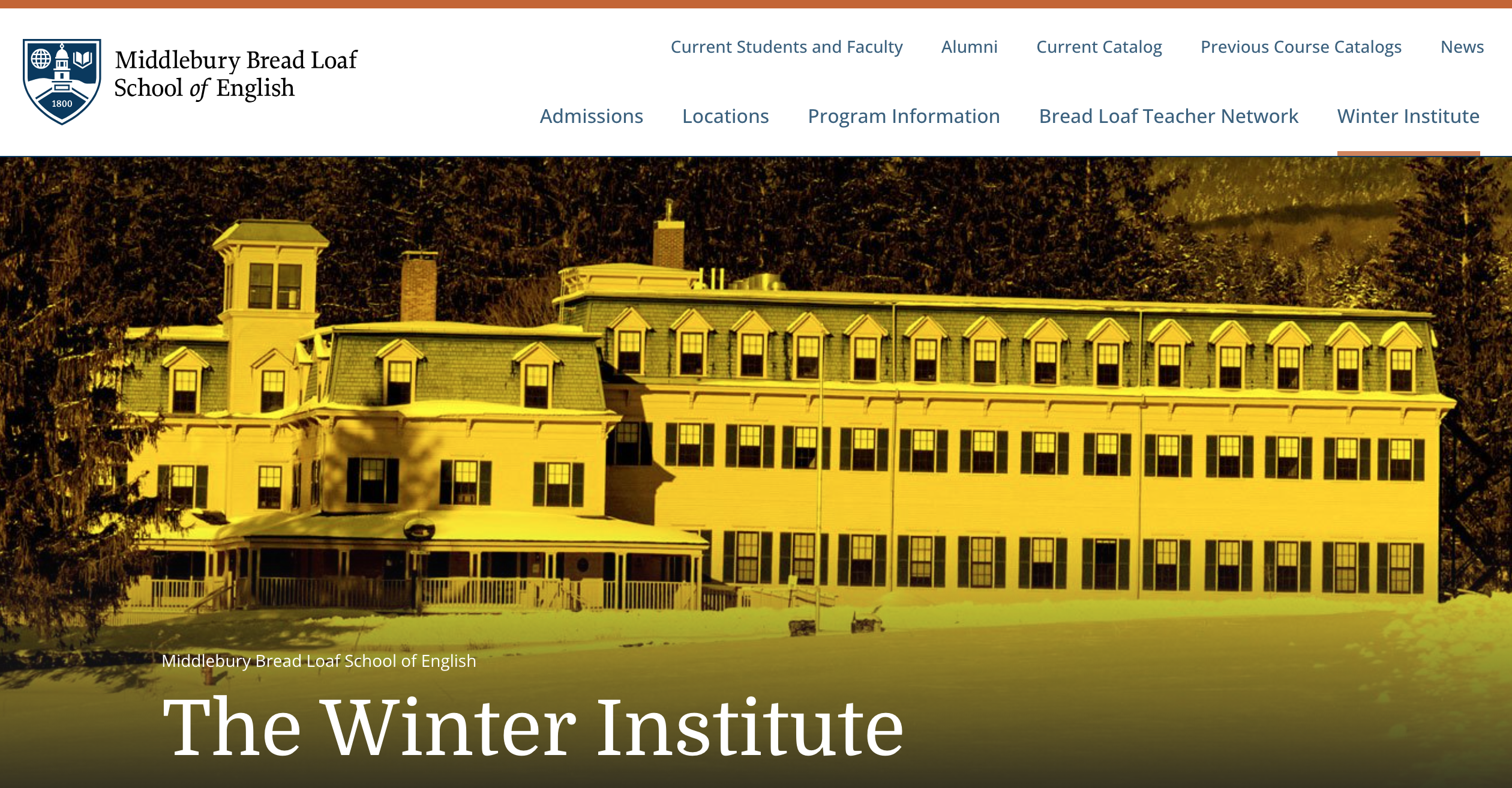In February, I got to attend the inaugural weekend of the Bread Loaf Winter Institute, a thought-provoking, enjoyable program I highly recommend. (If you want to check it out, click the photo above to learn more about the event and/or sign up for 2025's iteration. Depending on how I'm feeling, maybe I'll see you there.) Many aspects of the workshops I attended and speeches I heard have stuck with me, influencing my thoughts and pedagogy, but I'm writing this post about a particular discussion that came up in a question-and-answer session after one of the talks.
A high school English teacher (Almost everyone attending fit this description.) asked about teaching books that represent ethnicities with which he doesn't identify. His point, as I understood him, was that he can't cover enough ethnicities to provide those literature-as-mirror moments he would love to give to all of his students. He said that even when he thinks he's aligning his book selections with the identities of the students in his classes, some of them say that the book doesn't feel authentic to their lived experiences. (Please note that when I first wrote this post, I had several words in the paragraph above in quotation marks because they are his words rather than mine, but I realized that formatting looked condescending, which I don't mean to be. Still, I'd like to note that although I understand what he was trying to ask, I wouldn't use his wording.)
Two people responded to his question. First, one of the professors talked about how books can't, don't, and shouldn't try to represent whole ethnicities. Fiction isn't designed to explain the condition of being any particular identity. Its goal is to tell a story about particular characters who have any number of identities. In fact, she argued, the best literature relays the most specific version of the human condition. Yes, I thought, what she said.
Then, the program's director added her take on what good literature does. She posited that no great book is derivative of any other work because good authors try to do new things. Literature that stands above never tries to show what it's like to be X-identity; rather, it makes us understand what it's like to be Y-unique human being. To which I, Molly-Bloom-like, thought yes, yes, and yes.
And I started thinking about the books I've read recently. As you know if you have read more than this one post, I read a lot of romance novels. You may not know that I read lots of different versions of romance, both different sub-genres (romance can also be mystery, adventure, historical, fantasy, etc) and with main characters and/or authors of different identities from mine (BIPOC, British, LGBTQ, Christian, short, etc.).
Recently, I read a NetGalley romance with a trans main character, and I didn't like the book. I was trying to figure out what I didn't like about it, and I realized that I didn't want to be lectured about what it's like to be trans. At too many moments in the novel, the author seemed to be trying to teach me about their trans-ness. Those scenes pulled me out of the story. Instead, I wanted to step into the trans man's experience and view it from the inside. That's what great literature does (and why reading fiction has been proven to increase empathy).
All of this, of course, is an argument for more representation. Once there are tons of romance novels about trans characters, each author won't feel the need to step outside of the story to educate readers. Right now, some authors don't have the luxury of assuming that everyone reading has read tons of books by, about, and featuring people of certain identities, and until they can make that assumption, they want to teach about their lives. They want to create a platform to share their experiences, but as the director of Bread Loaf said, a book can't simultaneously be good literature and have the express goal of showing what it's like to be a type of person. Instead, it's got to show what it's like to be a certain person (real or imagined) from inside that person's lived experiences.
Have you ever read a book and thought you were getting taught how it feels to be a whole type of person? Is there such a thing as a "type of person"? What's the best book you've read recently that shows you what it's like to be a certain, specific person? Did that book provide a window into an identity you don't share? Was it able to bring you along with that person's feelings for an emotional journey you might not get in your own body? Please write any thoughts you have in the comments.

The most glowing Broadway show review I’ve heard recently was from a white, male friend from rural New Hampshire who raved about Hell’s Kitchen, the semi-biographical story of Alicia Keys’ Harlem upbringing. He loved it particularly because he got swept up in his identification with the characters’ personalities, emotions, and struggles despite their external identity differences. (I haven’t seen it. But now I want to.)
Maybe that’s a sign of great art — if it can make us feel empathy (rather than pity or nothing) and connectedness despite its not being a reflection of our own identities.
Pithy comment 286 (Book not Platform), thanks.
Thanks!